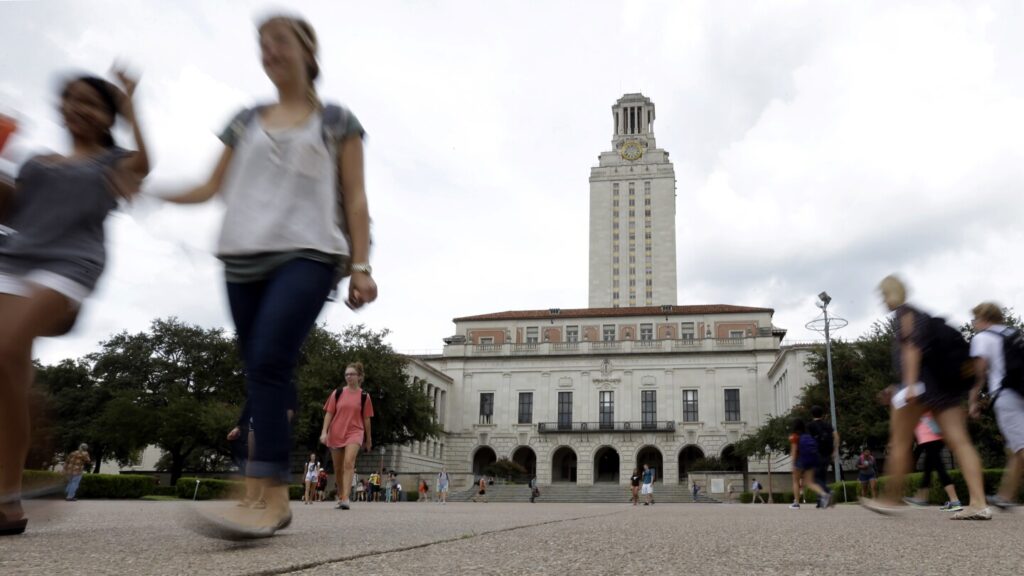AUSTIN, Texas (AP) — For two decades on Texas college campuses, it was a resilient law in the face of Republicans’ hardening immigration agenda: in-state tuition prices for students who did not have legal resident status.
But in a flash, the Texas policy that was the first of its kind in the U.S. was halted Wednesday, blocked by a federal judge hours after the Justice Department sued to dismantle it. Republican Texas leaders did not fight the challenge, but instead eagerly joined it.
The surprise and quick end to the law, known as the “Texas Dream Act,” stunned immigration advocates and Democrats, who called it a cruel punishment for hardworking students that will ultimately hurt the state’s economy. Republicans cheered the outcome and U.S. Attorney General Pam Bondi suggested that states with similar tuition policies could face similar actions.
The lighting ruling ended a Texas policy that had once enjoyed bipartisan support when it was created in 2001, helped tens of thousands of students get into college and spawned similar laws in two dozen states.
Here’s what to know:
The Texas law and the impact
The Texas tuition policy was initially passed with sweeping bipartisan majorities in the state Legislature and signed into law by then-Gov. Rick Perry, a Republican, as a way to open access to higher education for students without legal residency already living in the state. Supporters then and now say it boosted the state’s economy by creating a better-educated and better-prepared workforce.
The law allowed students without legal resident status to qualify for in-state tuition if they had lived in Texas for three years before graduating from high school, and for a year before enrolling in college. They also had to sign an affidavit promising to apply for legal resident status as soon as possible.
Texas now has about 57,000 qualifying students enrolled in its public universities and colleges, according to the Presidents’ Alliance on Higher Education and Immigration, a nonpartisan nonprofit group of university leaders focused on immigration policy. The state has about 690,000 students overall at its public universities.
The difference in tuition rates is substantial.
For example, at the University of Texas Rio Grande Valley, a 34,000-student campus along the border with Mexico, a state resident will pay about $10,000 in basic tuition for a minimum full-time class schedule in the upcoming school year. A non-resident student will pay $19,000.
“UTRGV understands that the consent judgment may affect financial plans already made by individual students,” the school said in a statement Thursday. “Our priority and focus are on minimizing disruption to student success consistent with applicable law and helping students navigate this transition with clarity and care.”
Political pushback and a swift end
The law stood mostly unchallenged for years, but it came under fire as debates over illegal immigration intensified. In the 2012 Republican presidential primary, Perry ended up apologizing after saying critics of the law “did not have a heart.”
The law withstood several repeal efforts in the Republican-dominated Legislature. In the legislative session that ended on June 2, a repeal bill did not even get a vote.
But the ax fell quickly. On Wednesday, the Trump administration filed a lawsuit calling the law unconstitutional. State Attorney General Ken Paxton, a key Trump ally, chose not to defend the law in court and instead filed a motion agreeing that it should not be enforced.
With the state administration aligned with the Trump administration, the law was suddenly struck down by a federal judge without even an argument on the lawsuit’s merits or a response from the students affected.
Trump, immigration and higher ed
The Trump administration challenged the law in a border state where Gov. Greg Abbott, Paxton and the Republican leadership have given full-throated support to his immigrant crackdown efforts and have spent billions trying to help.
The ruling also expanded efforts by Trump to influence higher education across the country. The administration has leveraged federal funding and its student visa authority to clamp down on campus activism and stamp out diversity, equity and inclusion initiatives.
Impact beyond Texas
The ruling affected only the Texas law, but with nearly half of U.S. states having similar policies, Bondi suggested the administration could pursue similar action elsewhere. Florida Gov. Ron DeSantis recently signed a bill to repeal the law in that state in July.
“Other states should take note that we will continue filing affirmative litigation to remedy unconstitutional state laws that discriminate against American citizens,” Bondi said.
Immigration lawyers and education advocates said they are assessing if there are legal avenues to challenge the Texas ruling.
“Make no mistake, advocates, students, campuses are not going to just take this,” said Miriam Feldblum, president and chief executive officer of the Presidents’ Alliance on Higher Education and Immigration. “But I have no doubt there will be an effort to do this (elsewhere).”


